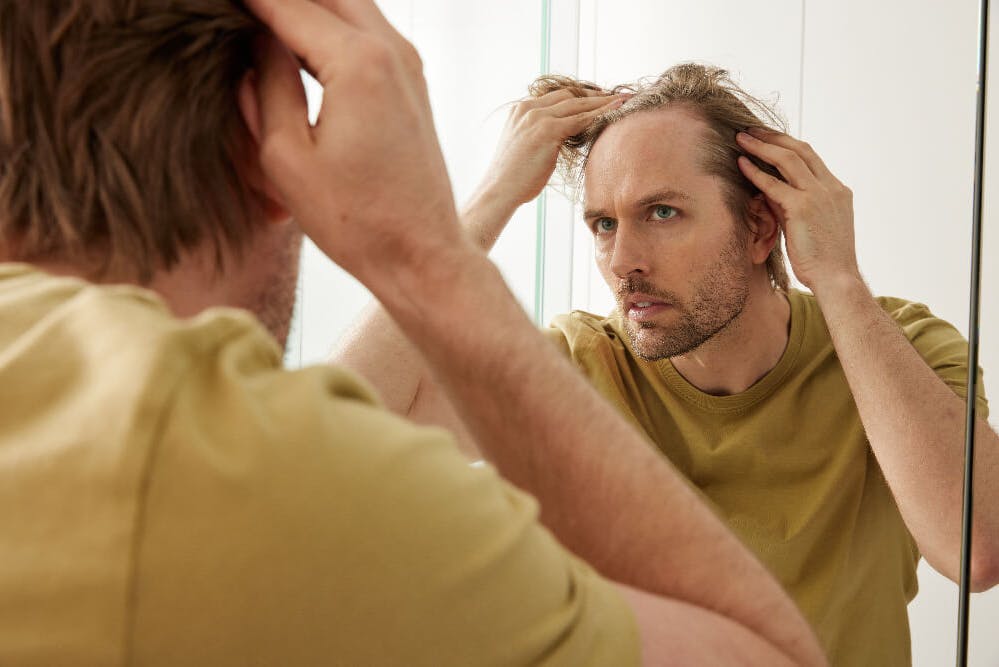


When it comes to hair loss, there’s much misinformation floating around. You’ll hear all sorts of hair loss myths from your friends and family, people on the web, and even doctors. Let Mosh clear the air regarding hair loss treatments and myths about hair thinning.
In some cases, it’s due to the sensitive nature of the topic. People aren’t willing to talk about hair loss like they do other medical conditions, so poor information is never corrected. In other cases, unscrupulous companies push bad science to keep people buying their products.
When it comes to hair loss, there’s a lot of misinformation floating around.
Sadly, these myths aren’t just silly. They affect men’s hair follicles treatment. According to the National Institute of Health[1], patients frequently present false beliefs about the causes of their condition to their doctor, which affects how the doctor diagnoses and treats their problem.
For instance, if a patient believes hair loss only comes from the mother’s side of the family (it doesn’t - more on that in a minute), he may tell a doctor he has no family history of hair loss, even though his father has been slick bald for years. This forces the doctor to make decisions based on bad information.
Treating your hair loss starts with a healthy dose of information. Here are the ten most common hair loss myths everyone seems to believe.
An extremely common myth is that hair loss comes from your mother’s side of the family. If your mother’s father is bald, the myth says, you will be too.
Unfortunately, it’s not that simple when discussing hair fall. Hair loss is a polygenic trait, meaning it can’t be explained by a single gene that’s passed down from one person to another. Some researchers think hair loss is caused by the interaction between several genes that come from both sides of your family, affecting hair follicles.
Furthermore, baldness can skip generations, so even your immediate family isn’t an indication of your situation. So if you suspect you have male pattern baldness, don’t neglect treatment because the condition isn’t common in your family.
It’s true that periods of chronic or traumatic stress can cause hair to fall out. This includes things like dramatic weight gain or loss, illnesses, deaths of a loved one, etc.
Stress-caused hair loss is a form of temporary hair loss called telogen effluvium, where follicles are pushed into the shedding and resting phase. This is temporary and easily treated through several techniques, including just waiting.
Everyday stress, however, doesn’t cause hair loss. You aren’t losing your hair because you have to sit in traffic or deal with an unhelpful coworker, but stress can affect hair growth.
That said, too much stress isn’t good for your overall health. Find healthy ways to avoid or cope with stressful stimuli that may affect hair growth. Dealing with frequent stress can affect your mood, self-esteem, and confidence, which may already take a hit due to hair thinning.

The myth that hats cause hair loss has existed for a long time. It’s hard to identify where this myth started, but it seems to originate from a series of clinical studies in the 70s and 80s that studied thermoregulation (your body’s ability to regulate its temperature). Those studies supposed that hats make the head warm, so the body sheds hair to cool off. Future studies proved them wrong, but the myth remains.
There is a correlation between hats and hair loss, however. It’s not that hats cause hair loss, but that hair loss causes guys to wear hats. This is why the myth won’t abate.
While it’s possible that wearing something too tight on your head can cause traction alopecia (hair loss due to trauma to the hair shaft and follicle), you’d have to wear something painfully tight to cause permanent hair loss.
This is a popular myth that isn’t based on any science. Some people think sex and masturbation increase your testosterone levels, which means there’s more DHT in your body (the hormone that binds to follicles and chokes them off). This just isn’t true.
Other people say ejaculation expels protein from your body, which you need to grow hair. That is true, but there’s only a tiny amount of protein in seminal fluid compared to the rest of your body. Ejaculate contains an inconsequential fraction of it. Besides, your body continually makes and replaces seminal fluid anyway, even if you don’t ejaculate.
So don’t torture yourself by abstaining from sex or masturbation because you think it will bring back your hair.

It’s an old myth that bald guys are victims to their testosterone levels. If DHT causes hair loss and comes from testosterone, bald men must have more testosterone, right? No, it’s not that simple when considering the various types of hair loss. In fact, there are plenty of guys with full heads of hair that have higher testosterone levels than bald guys, and lots of bald dudes with low testosterone.
However, bald guys typically have higher levels of 5-alpha-reductase, which is an enzyme that converts testosterone to DHT and androgen receptors on follicles in balding regions.

Pruning your garden flowers may make them healthier and grow faster, but your hair isn’t foliage. There’s no evidence that cutting your hair will make it grow. If that were the case, every balding guy who trims their hair short or shaves their head would sprout a full head of hair in no time.
Overuse of products and heat (and even rubbing your head too hard with a towel) can cause your hair to turn brittle and break, but they don’t cause permanent hair loss. If you mistreat a hair and it sheds, the follicle will just produce another one.
Tight hairstyles, however, can cause traction alopecia. Over time, traction alopecia can damage or kill the follicle, which can cause permanent hair loss or thinning hair. But this requires long periods of tightly pulled hair. It certainly doesn’t kick off male pattern baldness.
Sadly, hair loss isn’t limited to old men. If you’re genetically disposed to male pattern baldness, it can appear as early as your teens. The next time you attend a high school musical or graduation party, check out the hairlines. You’ll see the early signs of male pattern baldness.
Guys who start losing their hair early face a particularly difficult challenge. Finasteride, the leading tool to treat DHT, isn’t safe for men who haven’t finished their hormonal development phase. However, they should still talk to a doctor about potential treatments.

There’s not much to say about this hair loss myth except that it’s false. While adequate blood flow to the scalp is important for healthy hair (the follicles need oxygen and nutrients, after all), there’s no evidence that people suffering from hair loss have poor circulation. Furthermore, there’s no evidence that poor circulation causes male pattern baldness.
You’ll hear this claim repeated by various hair loss products that try to take advantage of desperate people. 30 days is about how often men get their hair cut, so it seems like a decent time frame for their claim.
There is no treatment, proven or otherwise, that will grow hair back to any reasonable length in a month. Some of your hair sits in a resting phase at any given time anyway, which means it can’t start growing right away.
Proven hair loss treatments take at least six months to see any results, but usually up to a year. The longer you maintain treatment, the greater the effect becomes. Fixing your hair loss situation is a process, not a one-off fix.
By busting some of the common hair loss myths, hopefully, we’ve shown that most of the hair loss “causes” you hear about are nonsense. Male pattern baldness is a genetic condition that can only be treated in a few proven ways. The sooner you start your treatment, the more likely you’ll halt your hair loss and recover your hair. Start today and learn how to prevent hair fall.
P.S. Mosh doesn't just provide the best hair loss treatment programs; we specialise in making men’s health stuff easier. We offer mental health support, weight loss treatments, impotence and premature ejaculation medication, as well as enlarged prostate check and even some over-the-counter products if you’re yet ready for the treatments.












Ready to Treat Hair Loss?